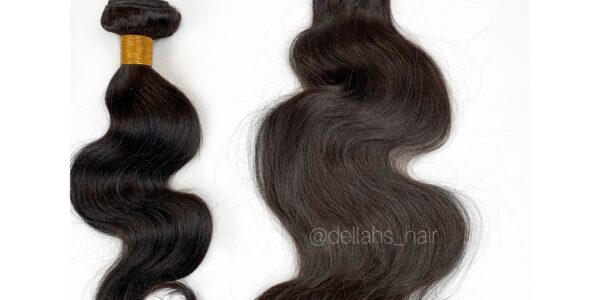

Ever bought a bottle of shampoo and you see tags like ‘Sulfates free’, ‘No Silicone’, No SLE, SLS’?
If you are a hair fanatic like us, we bet you have come across these words. That’s because the above-mentioned are ingredients commonly used in shampoo and other hair care products.
These ingredients have their distinct function in any hair product, while they may have their advantages you should be wary of some of its harmful effects to your hair and body.
Whatever happened to the good old days where we could get away with putting anything on our skin right?
Silicone, Sulfates- (SLE, SLS) what are they?
Silicone – Have you ever wondered what makes some weaves and hair extensions shine bright like diamonds? Lol! Those are silicones. They are responsible for that sleek look and texture on the hair.
Silicones are polymers, which are large molecules composed of many repeated sub-units. These polymers are made up of siloxane – a chain of alternating silicon atoms and oxygen atoms frequently combined with carbon or hydrogen. Silicone is usually an element found in sand, where it is extracted from and passed through hydrocarbons.
We know this is a whole lot of scientific jargon to take in, but stay with us as we further break it down.
According to Bridget Brager, celebrity hairstylist she said, “Silicone is a mineral. It is an effective ingredient commonly used in hair-care products. It provides slip and shine, can help smooth and straighten hair, and gives hair a luxurious, conditioned feel.”
But that doesn’t mean this great feature is good for your hair. Although, it has its advantages for your hair, the constant use of this can cause more harm than good. The use of silicone and sulfates in hair products is still one of the most controversial discussions in the industry – even though these ingredients have been around since as far back as the 70’s!
Basically, Silicones are there to give the hair that moisturizing, smoothing and shiny effect. They also help with easy combing. Now, one thing to note is that some silicones are heavier than others – and the heavier they are, the more they begin to build up on the hair over time, preventing other nutrients from penetrating into the hair. If you are wondering how to know whether your bottle of shampoo contains silicone, just look out for ingredients that end with ‘-cone’. Silicones like Dimethicone, Trimethicone and Simethicone are examples of heavy silicones that are not water-soluble, and may not come off easily.
You should definitely look out for these names the next time you go shopping for your hair care products!

Disadvantages of Silicone On Your Hair
Silicone is the same thing as rubber or plastic used as a sealant against water. When used in hair, it gives this illusion of shine but not the kind of shine you want. It’s actually a fake shine from the plastic, unlike the shine that comes when the cuticle layer is sealed and light reflects off the hair, which only happens when hair is properly hydrated.
Another thing silicone does to your hair is that it prevents moisture from penetrating the hair shaft. This makes your hair to magnet dirt, this is to say that silicone only gives temporary shine to your hair and then piles up dirt on your hair afterward. These specks of dirt, later on, make the hair dry, dull and weak which will further lead to hair breakage. Silicones like Lauryl Methicone Copolyol are lighter types of silicones that are water-soluble and can come off easily, just in case you still decide to go down that route.
READ ALSO: 7 Products You Should Avoid Using On Your Raw Hair
Sodium Lauryl Sulfate (SLS) and Sodium Laureth Sulfate (SLES) is a contraction of sodium lauryl ether sulfate, an anionic detergent, and surfactant found in many personal care products which acts as an effective foaming agent.
These two sulfate ingredients; (SLS) and (SLES) are used for the same thing. They are commonly used in many soaps, shampoos, detergents, toothpastes and other products that we expect to lather. Although, SLES is somewhat less irritating than (SLS) because it cannot be metabolised by the liver and its effects are therefore much longer-lasting.
Disadvantages of SLES and SLS
Now, it’s about to get worse. Concentrations of sulfates and silicone as low as 0.5% could cause irritation and concentrations of 10-30% will cause skin corrosion and severe irritation.
Another major effect of this chemical on your hair is, it can strip natural oils from the scalp and hair. This can equally make your hair dry and brittle. And if you have a sensitive scalp, sulfates can cause irritation like redness, dryness, and itching. According to Teen Vogue, sulfates tend to be extra when doing their job; “When it comes to hair products, the concern has to do with the state these detergents may leave your locks in. When used in shampoos, sulfates are very efficient cleansers—maybe a little too efficient.”

You should also note that, if you are into raw hair extensions you should always avoid products with these ingredients. This is because using sulfate-based products further strips the hair of the nutrients it already lost when it was collected from its donor. In this case, we recommend you use only natural shampoo and leave-in conditioner for your natural hair and your raw hair extensions.
However, while some people may benefit from a sulfate-free product, others might need to stick to some sulfate-based products for their hair. For instance, people with dry or frizzy hair should consider sulfate-free shampoo.
This is because Sulfate-free cleansers maintain the natural oils on the scalp and hair, which leaves your hair more moisturized. On the other hand, if you have oily hair or suffer from dandruff, a sulfate-based shampoo will help absorb and get rid of the oils on your scalp.
It’s up to you to decide which one works for your hair best. Just remember to note all the cautions listed above and always check your ingredients!
We hope this article was helpful? Let us know in the comment section.
Have a fabulous day Queens! xx
Comments
Post a Comment
You must be logged in to post a comment.








Pingback: 7 Hair Products You Should Avoiding Using On Your Raw Hair